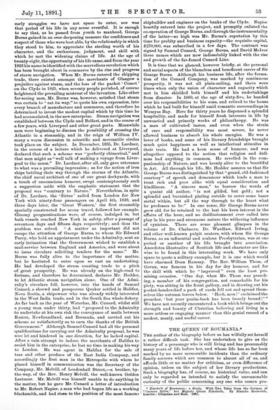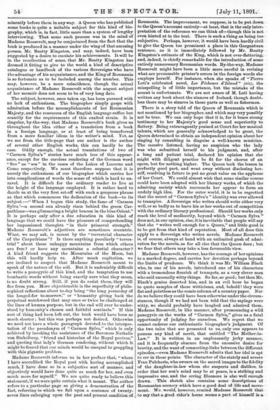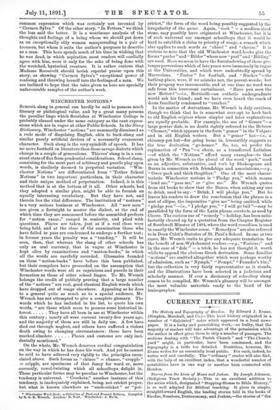THE QUEEN OF ROUMANIA.* THE author of the biography before
us has wilfully set herself a rather difficult task. She has undertaken to give us the history of a personage who is still living and has presumably many years of life before her, and whose life has so far been marked by no more memorable incidents than the ordinary family sorrows which are common to almost all of us, and affords little or no matter for criticism, or even difference of opinion, unless on the subject of her literary productions. Such a biography has, of course, no historical value, and can only be regarded as intended to satisfy the unreasonable curiosity of the public concerning any one who comes pro-
• Elisabeth of Roumania: a Study. With Two Tales from the German of "Carmen Bylva," her Majesty Queen Elizabeth. By Blanche Roosevelt. London Chapman and Hall. 1891. minently before them in anyway. A Queen who has published some books is quite a suitable subject for this kind of bio- graphy, which is, in fact, little more than a system of lengthy interviewing. That some such process was in the mind of Madame Roosevelt, may be conjectured from the fact that the book is produced in a manner under the wing of that amusing person, Mr. Beatty Kingston, and may, indeed, have been suggested by a desire to emulate his achievements. It will be in the recollection of some, that Mr. Beatty Kingston has deemed it fitting to give to the world a kind of descriptive catalogue or handbook of the various Sovereigns who have the advantage of his acquaintance, and the King of Roumania is so fortunate as to be included among the number. This may, however, be a mere coincidence, though the actual acquaintance of Madame Roosevelt with the august subject of her memoir does not seem to be of very long date.
The subject, however, once taken up, has been pursued with no lack of enthusiasm. The biographer simply gasps with admiration before the accomplishments of her Roumanian Majesty, and the resources of the English language suffice but scantily for the requirements of this exalted strain. It is singular, by-the-way, that Madame Roosevelt's book gives us throughout the idea either of a translation from a book in a foreign language, or at least of being transferred from a more familiar idiom in the writer's mind. Yet, as we see from the title-page that our author is the author of several other English works, this can hardly be the case. Oddly enough, the actual translations of two of "Carmen Sylva's " stories have much less of this appear- ance, except for the careless rendering of the German word " See " as "sea" in the cases of the Lakes of Lucerne and Como respectively. We must therefore suppose that it is merely the enthusiasm of our biographer which carries her into complications of words the sense of which is hard to un- ravel. It is difficult for the ordinary reader to live at the height of the language employed. It is rather hard to dazzle us at the very first set-of with such a gorgeous phrase as that which commences the dedication of the book—to its subject :—" When I began this study, the fame of Carmen Sylva '—a second sun already risen behind the green Car- pathians—was glimmering a bright beacon in the blue Orient." It is perhaps only after a due education in this kind of language that we could have the pleasure of comprehending her impassioned thoughts "in their primeval strength." Madame Roosevelt's adjectives are sometimes eccentric. What, we may ask, is meant by the "terrestrial character of the Carpathians"? Is there anything peculiarly " terres- trial " about those unhappy mountains from which others are free ? or have any mountains a celestial character P A kind friend suggests the Mountains of the Moon, but this will hardly help us. After much cogitation, we are inclined to suspect that Madame Roosevelt meant to speak of the nature of the soil. But it is undeniably difficult to write a panegyric of this kind, and the temptation to use bombastic words without being exactly sure what they mean, is no doubt strong. Still, if you do resist them, they will flee from you. More objectionable is the superfluity of philo- sophical reflections about to-day being "the long yesterday of the longed-for to-morrow," or "humanity giving back the perpetual watchword that may once or twice be challenged at the lines of human purpose, but in the end will ever be under- stood by humanity's chosen and faithful sentinels." If this sort of thing had been left out, the book would have been so much shorter ; but this was perhaps not desired. Otherwise we need not have a whole paragraph devoted to the interpre- tation of the pseudonym of "Carmen Sylva," which is only achieved by invoking the assistance of the Baroness Nathalie von Stakelberg, "friend and historian of the Royal poetess," and quoting that lady's German rendering, without which it might be feared that our minds would be unequal to grappling with this gigantic problem.
Madame Roosevelt informs us in her preface that, "where I have accredited the Royal poet with having accomplished much, I have done so in a subjective sort of manner, and objectively would have done quite as much for her, and even much more for myself." We are quite ready to believe this statement, if we were quite certain -what it meant. The author refers to a particular page as giving a demonstration of the fact, referring to which we fall upon a sentence of twenty- seven lines enlarging upon the past and present condition of Rornnania The improvement, we suppose, is to be put down to the Queen's account entirely—at least, that is the only inter- pretation of the reference we can think of—though this is not even hinted at in the text. There is such a thing as being too subjective. Perhaps, however, it would have been hardly civil to give the Queen too prominent a place in this Gargantuan sentence, as it is immediately followed by Mr. Beatty Kingston's estimate of the King, which is not over-flattering, and, indeed, is chiefly remarkable for the introduction of some entirely unnecessary Roumanian words. By-the-way, Madame Roosevelt might have been a. little more careful in revising what are presumable printer's errors in the foreign words she employs herself. For instance, when she speaks of "Pierre Loti's celebrated novel, Les Pecheurs el' Island " (sic), the misspelling is of little importance, but the mistake of the accent is unfortunate. We are not aware of M. Loti having written any book about the sinners of Iceland, though doubt- less there may be sinners in those parts as well as fishermen.
There is a story told of the Queen of Roumania which is not mentioned by her biographer, and which may very possibly not be true. We can only hope that it is, for it bears strong testimony to her Majesty's good sense and superiority to flattery. Being extravagantly praised at Court for her musical talents, which are generally acknowledged to be great, the Queen determined to obtain an independent opinion about her singing by consulting in disguise a well-known musician. The maestro listened, having no suspicion who the lady was who submitted herself to his judgment, and, after a long and patient trial, declared his opinion that she might with diligent practice be fit for the chorus of an opera, but for nothing higher. The Queen took the lesson in perfectly good part, and went away without disclosing her- self, resolving in future to put no great value on the applause of her Court. We could almost wish that some similar course could have been adopted with her literary works, of which the admiring society which surrounds her appear to form an unduly high idea. For the outer world, it is to be regretted that the secret of "Carmen Sylva's " identity was ever allowed to transpire. A Sovereign who writes should write either very well, or so badly as to leave his or her works out of competition with the ordinary literary professional. Should her works only reach the level of mediocrity, beyond which "Carmen Sylva ' does not, in our opinion, rise, it is inevitable that people will say that she "writes well enough for a Queen," and little good is to be got from that kind of reputation. Most of all does this apply to a Sovereign who writes novels. Madame Roosevelt is, of course, always at hand with an unlimited gush of admi- ration for the novels, as for all else that the Queen does ; but we fear that others may take a less favourable view.
Madame Roosevelt, however, has the courage of her opinions to a marked degree, and carries her devotion perhaps beyond the limits of prudence. We think it was Mr. William Black who, in one of his novels, introduced one of his characters with a tremendous flourish of trumpets, as a very clever man who said unusually witty things. So far, so good ; but then Mr. Black's genius deserted him, and in an evil hour he began to quote samples of these witticisms, and, behold ! they were flat and pointless as the comic column of a country paper. Nor do we believe they could have been otherwise under the circum- stances, though if we had not been told that the sayings were witty, we should probably have laughed and admired them. Madame Roosevelt, in like manner, after pronouncing a wild panegyric on the works of "Carmen Sylva," gives us a fatal opportunity of judging for ourselves. We regret that we cannot endorse our enthusiastic biographer's judgment. Of the two tales that are presented to us, only one appears to possess any kind of merit, that entitled "The Mother-in- Law." It is written in an unpleasantly jerky manner, and it is frequently obscure from the excessive desire for brevity, and the want of connecting-links between the different episodes,—even Madame Roosevelt admits that her idol is apt to err in these points. The character of the stately and severe Fran Ptdcheria, who swears on the sacred images to the fidelity of the daughter-in-law whom she suspects and dislikes, in order that her son's mind may be at peace, is a striking and impressive one, and the erring Eleonore is also well enough drawn. This sketch also contains some descriptions of Roumanian scenery which have a good deal of life and move- ment. We would, however, remind Madame Roosevelt that to say that a good rider's horse seems a part of himself is a
common expression which was certainly not invented by " Carmen Sylva." Of the other story, "In Fetters," we think the less said the better. It is a wearisome analysis of the thoughts and feelings of a being whom we should put down as an exceptionally silly woman masquerading in a pair of trousers, but whom it suits the author's purposes to describe as a man. This hero spends much of his time in wishing that he was dead, in which aspiration most readers will cordially agree with him, were it only for the sake of being done with the wretched, hysterical creature. It is rather curious that Madame Roosevelt should lavish especial praise upon this story, as showing "Carmen Sylva's " exceptional power of realising and throwing herself into the feelings of a man. We are inclined to hope that the tales given us here are specially unfavourable samples of the author's work.




































 Previous page
Previous page